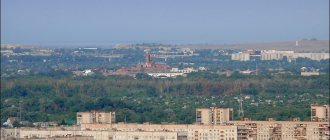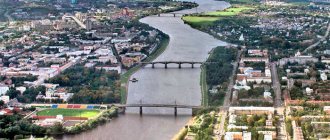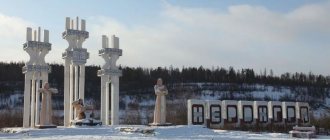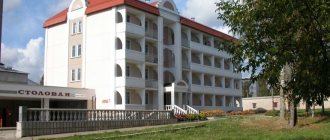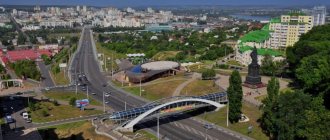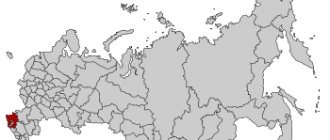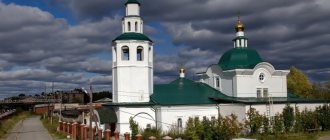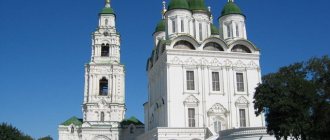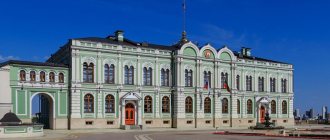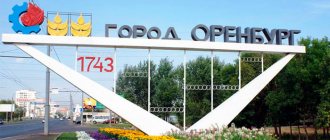Judging by the first mention in the chronicles, Tver is only 12 years older than Moscow. However, thanks to its favorable location on the trade route from Novgorod to northeastern Rus', Tver grew and became rich very quickly. Already in the 13th century, the city seriously laid claim to primacy among the Russian lands. This was also facilitated by the fact that Tver was located north of the main direction of the Mongol invasion and suffered less than other territories. It is not surprising that the Tver prince Yaroslav became the Grand Duke of Vladimir in 1264, receiving formal seniority over all of northeastern Russia. At the same time, he did not go to Vladimir, devastated by the Tatars, remaining in Tver, which had already begun to be overgrown with stone buildings.
Moscow could only dream of such splendor at that time. Daniil Alexandrovich, who ruled there, was considered a petty prince. Luck helped him improve the situation: Prince Ivan of Pereyaslav died childless, and bequeathed all his lands to a Moscow relative. Soon after this gift, Daniel died, and his son Yuri ascended the princely throne. He increased the Moscow lands by taking away the Mozhaisk principality. After that, he began to look at the lands of Tver. In addition, Yuri wanted to become the Grand Duke of Vladimir, whose place had just become vacant. Mikhail Yaroslavich Tverskoy also had ambitions for this title. The applicants did not fight, but rushed to the Horde - all important personnel decisions in Rus' were then made by the Mongols.
Prince Mikhail Tverskoy, Russian stamp 1996. (personal collection of the author)
The conquerors, by and large, did not care who would become the formal ruler of one of the parts of their empire. They were ready to give the title to whoever paid the most for it. Moscow could not compete with the wealth of the rich Tver, and the Grand Duke's label went to Mikhail. Offended, Yuri gathered an army and attacked Tver. The war was not fought very actively and did not bring much success to Moscow. Here, very opportunely, the Horde khan died, and Mikhail Tverskoy got ready to go to Sarai so that the new khan would confirm his powers. Yuri Moskovsky reached the Horde before his opponent. In Sarai, he gave gifts to everyone and even managed to marry the sister of the new khan. The Mongolian Konchaka converted to Orthodoxy and became Agafya.
The newly-minted relative of the khan returned to Moscow, confident in his brilliant future. He was accompanied by a Mongol retinue. The Tver prince did not attack the Horde. He took advantage of the fact that the Muscovites were setting up their camp separately from the Mongols, and attacked only the Russians. The Horde did not rush to protect Yuri, and he was completely defeated. Even Agafya was captured by the Tver people, and her husband fled shamefully. Yuri did not know what to do, when suddenly the news reached him that his wife had died in Tver captivity. With a new slander against his rival, the Moscow prince rushed to the Horde. He said that the khan’s sister was killed by the evil Tver people. Mikhail was summoned to the Khan's court. After a long trial, he was found guilty of the death of Konchaka-Agafya, put in stocks and given to the “heartbroken” widower. Yuri's henchmen tortured the Tver prince, and the Grand Duke's label finally went to the main Muscovite.
Death of Mikhail Tverskoy. (tvernews.ru)
Yuri gave the corpse of his enemy to his relatives only for a substantial ransom. The son of the murdered man, Dmitry Mikhailovich, was forced to publicly recognize the supremacy of Moscow and give Yuri all the collected tribute for transfer to the Horde. The Moscow prince was not only treacherous, but also greedy, which destroyed him. He decided to wait before sending money to the Mongols and lent it to the Novgorodians at high interest rates. While the Mongol tribute was being circulated in trade transactions of Novgorod merchants, Dmitry Mikhailovich went to the Horde and denounced his father’s murderer. Frightened Yuri also rushed to the Sarai. When both princes appeared before the khan, the hot-tempered Dmitry could not restrain himself and hacked to death his blood enemy. Such a violation of decency did not go unpunished: the young prince of Tver was beheaded. The first stage of the confrontation between Moscow and Tver ended in a draw.
The burning of Moscow as revenge for aggressiveness
Subsequently, Muscovites tried to hurt Tver at every opportunity. In 1327, an anti-Mongol uprising began in the northern city - Tver residents beat the tribute collectors. Moscow prince Ivan Kalita and his squad willingly took part in the punitive expedition. Together with the Mongols, he approximately punished and burned Tver, which then hardly recovered for almost half a century.
Burning of Tver. Miniature from a chronicle of the 16th century. (wikipedia.org)
The next stage of the confrontation between the two principalities dates back to the beginning of the reign of Dmitry Ivanovich in Moscow, who had yet to achieve the honor of being called Donskoy. In 1367, the 17-year-old prince decided that Tver, which had not yet recovered from the devastation, would become his easy prey. Mikhail Alexandrovich Tverskoy really did not have enough strength to resist, but he had a strong ally. Mikhail wisely married his sister to the Lithuanian prince Olgerd, a noble commander who had recently completely defeated the Mongols themselves at the Battle of Blue Waters. Olgerd did not refuse to help his brother-in-law.
Frightened by the Lithuanians, Dmitry retreated to Moscow, but did not abandon his plans. He, under the pretext of some church litigation, lured Mikhail to visit him and put him in prison along with his entire retinue. The Tver residents did not remain in captivity for long. An inspection from the Horde came to Moscow, and Dmitry, realizing that he could get into trouble for arbitrariness, released his captives. As a ransom, he took one of the volosts from Tver.
Offended and fleeced, the Tver prince again complained to his brother-in-law. The joint army of Lithuanians and Tver residents besieged Moscow. Dmitry managed to sit out in the Kremlin: the opponents did not dare to storm the white-stone stronghold, and its siege would have taken too much time. But all of Moscow, which remained outside the Kremlin walls, was devastated and burned. The loser Dmitry had to return the ill-fated volost, because of which he almost lost his capital.
Olgerd's siege of Moscow in 1368, stamp of Lithuania, 1932. (personal collection of the author)
Burnt Moscow took two years to rebuild. After which the persistent Dmitry again moved to Tver. He thought that he had everything figured out: Olgierd fought with the Teutonic Order in 1370 and had no time for Russian affairs. Muscovites plundered and burned the towns of Tver, taking away many civilians. Closer to Christmas, Olgierd dealt with the Order and found time to help Mikhail. Their army again approached the Moscow Kremlin, but again refused to storm the stronghold. Dmitry escaped with a slight fright.
The Tver prince understood that with the help of the Lithuanians alone he could not curb Moscow’s appetite. He went to the Horde, where at that time the Temnik Mamai ruled, who actually usurped power. Mikhail managed to please Mamai and returned home with a label for the reign of Vladimir - a sign of supreme power and the main reason for the feud between Moscow and Tver. Unexpectedly, Dmitry declared that the Horde was not his decree and refused to give Vladimir to his rival. Moreover, he soured the Horde ambassadors with bribes that he was able to return the Vladimir label to himself. After this incident, the authority of Moscow among the Russian principalities grew sharply: it became clear that the local prince was not afraid of the Mongols.
Over the years, not only Dmitry Ivanovich’s authority grew stronger, but also his leadership abilities. In 1372 he defeated the Lithuanians in open battle. Not the entire army of Olgerd suffered defeat, but only its vanguard, but the Lithuanian prince did not dare to fight a big battle. Three years later, Dmitry again attacked Tver. The reason for this was given to him by Prince Mikhail, who persuaded Mamai to return the ill-fated Vladimir label to him. Temnik returned the label and even promised to protect Tver in the event of an attack by Moscow, but the support was only verbal. This time Olgerd did not stand up for his relative, fearing the strong Moscow army, especially since Dmitry united the forces of several principalities dependent on Moscow and enlisted the support of Novgorod. As a result, Tver found itself alone against many enemies. Prince Mikhail bravely defended his capital, but the wooden walls could not stand it. The Tver prince was forced to admit defeat. Under the terms of capitulation, he had to call Dmitry “Big Brother” and give him several Tver volosts.
After the destruction of Moscow by Tokhtamysh in 1382, Mikhail once again tried to convince the Mongols to return the Vladimir label to him. The attempt was unsuccessful. Tver, however, retained its independence, but it could no longer compete in strength with Moscow, which quickly recovered from another burning.
Radishcheva Boulevard
Radishcheva Boulevard, Tver
Monument to Mikhail Krug
Monument to Mikhail Krug, Radishchev Boulevard, Tver
The main attraction of the boulevard can be considered the monument to Mikhail Krug. He was from Tver. The bronze sculpture was installed on City Day, June 24, 2007.
There is a special place on the bench to sit and take a photo.
Twice Krug’s guitar was cut off, and once the sculpture was painted in different colors.
Russians against Russians, or how to become a capital
Moscow finally absorbed the Tver principality a hundred years later. Ivan III then ruled in Moscow, and Mikhail again sat on the Tver throne, but this time Borisovich. They were relatives to each other, since Ivan was married to Maria, Mikhail’s sister. In 1467 she died, and family ties ceased to tangle Ivan’s hands. In 1483, Mikhail was also widowed. He found a new wife in Lithuania, having concluded a defensive alliance with the prince there. Ivan decided that this was an excellent reason to attack his former relative.
Ivan III. (wikipedia.org)
Tver no longer had the strength to resist. But the alliance with Lithuania was valid only on paper. Ivan did not completely finish off the enemy, limiting himself only to his humiliation. Mikhail Borisovich humbly asked for peace, broke the alliance with Lithuania and generally lost the right to any international relations. After this, Tver boyars and service people began to leave en masse for Moscow.
In 1485, the time came to put an end to almost two centuries of confrontation. Moscow clerks prepared a fake letter from Mikhail, allegedly sent by him to the Lithuanian prince Casimir. This piece of paper was enough for a new trip to Tver. Mikhail Borisovich tried to justify himself, swore his innocence, but it was all in vain. His last supporters left him, going over to the side of force. The Tver prince fled to Lithuania; he never returned to Rus', having received a rich estate from his father-in-law Casimir. The Tver principality finally lost its independence and was included in Muscovite Rus'.
It is unknown what our country would have looked like if Tver had become the main city of Rus' 700 years ago - history does not know the subjunctive mood. But then Moscow took over, and since then things in Russia have gone according to its rules. It all ended with a monstrous centralization of power and the transformation of the capital almost into a separate state, living completely differently from the rest of Russia.
Krylova Street
Avaev Almshouse
Avaevskaya almshouse, Krylova street, Tver
Fire station 1915
Fire station 1915, Krylova street, Tver
Hotel "Tverskaya"
Krylova Street emerges onto Smolensky Lane, and there, at the intersection with Vagzhanova Street, stands the Tverskaya Hotel. Tver residents call it simply - Ryumka.
This is the tallest building in Tver, its height is 77 meters. Built 1977-89. On the upper floors there is a panoramic platform over the city.
Zhigareva Street
Goat Museum
Bar "Lublin", Tver
MiG-27
MiG-27, Tver
Sorrow Church
Sorrow Church, Andrei Dementyev Street, Tver
Sorrow Church, Andrei Dementyev Street, Tver
Zhukov Square
Zhukov Square, Tver
College named after Konyaeva
College named after Konyaeva, Tver
College named after Konyaeva, Tver
College named after Konyaeva, Tver
Silver Street
Living room Galyani
Hotel Galyani, Tver
Plyushkin Museum
Plyushkin Museum, Serebryannaya Street, Tver
Plyushkin Museum, Serebryannaya Street, Tver
Synagogue
Synagogue, Pushkinskaya street, Tver
Vagzhanova Street
Chernobyl Heroes Square
Monument to the liquidators of the Chernobyl disaster, Chernobyl Heroes Square, Tver
This square remained nameless for a long time and received its name on October 21, 2006, when the monument to the “Liquidators of the Chernobyl Disaster (1986-1990)” was unveiled.
